 What are the Most Secure Locks for Properties
What are the Most Secure Locks for Properties
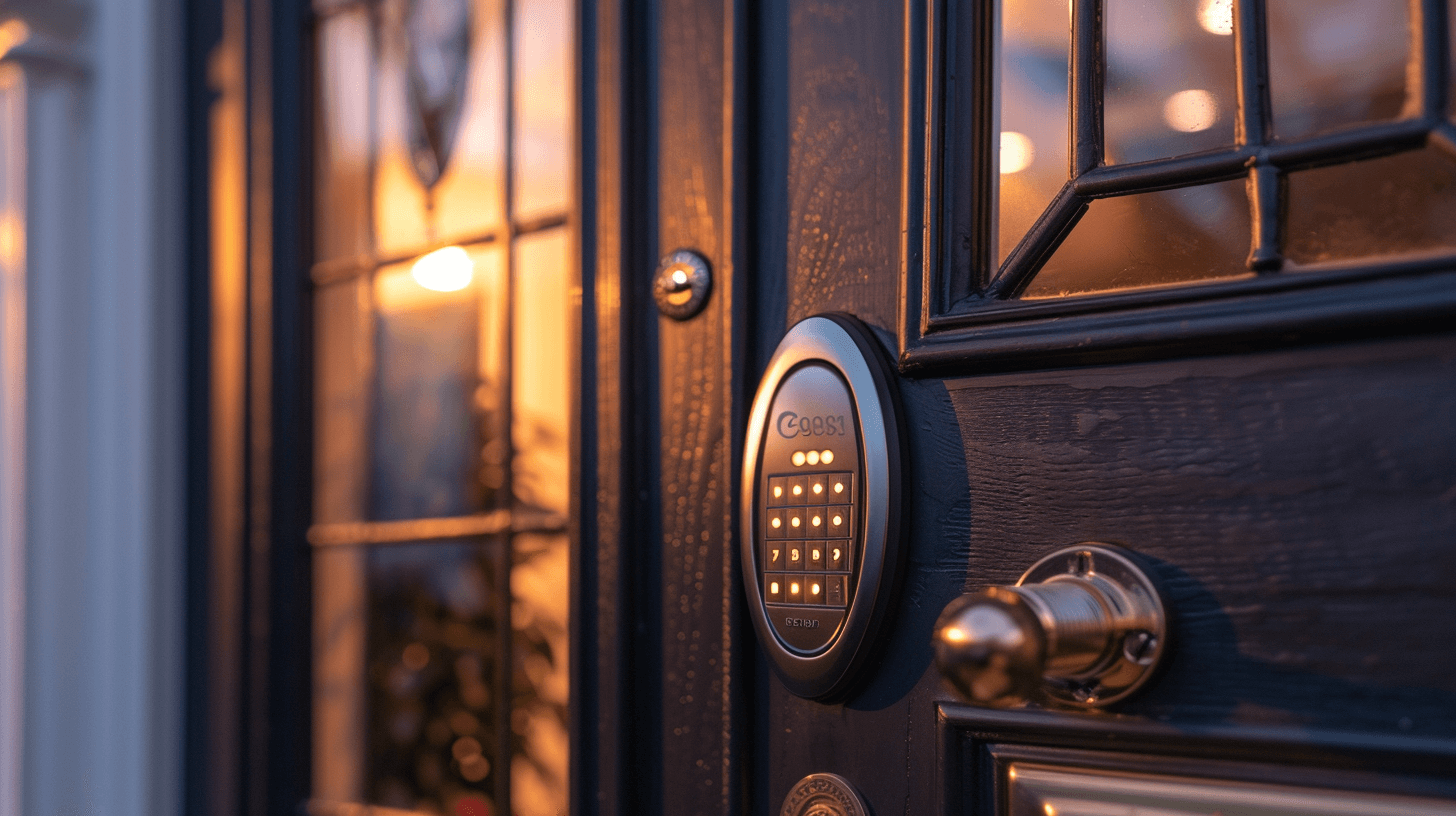
Evaluating High-Security Lock Standards
When considering the security of your property, understanding the impact of lock certifications is paramount. ANSI and British Standard certifications serve as benchmarks for lock quality, indicating a lock’s ability to withstand attempts at forced entry. Locks that meet these standards have undergone rigorous testing for durability, strength, and tamper resistance.
The Significance of ANSI Grade 1 Certification
ANSI Grade 1 locks represent the pinnacle of lock security, designed for commercial security where the risk of break-ins is higher. These locks are tested to endure more cycles and strikes compared to Grade 2 and Grade 3 locks, making them a robust choice for protecting your assets.
The Importance of the Kitemark in Lock Selection
The British Standard Kitemark is a symbol of trust and quality, signifying that a lock conforms to the high standards set by the British Standards Institution. This certification ensures that the lock has been independently tested and verified for security performance.
Empowering Property Owners Through Lock Grading Systems
By understanding lock grading systems, you become equipped to make informed decisions about the security hardware you choose. Knowledge of these standards allows you to select locks that not only meet your security needs but also comply with insurance requirements, potentially leading to lower premiums.
Mechanical Versus Electronic Locks: A Comparative Analysis
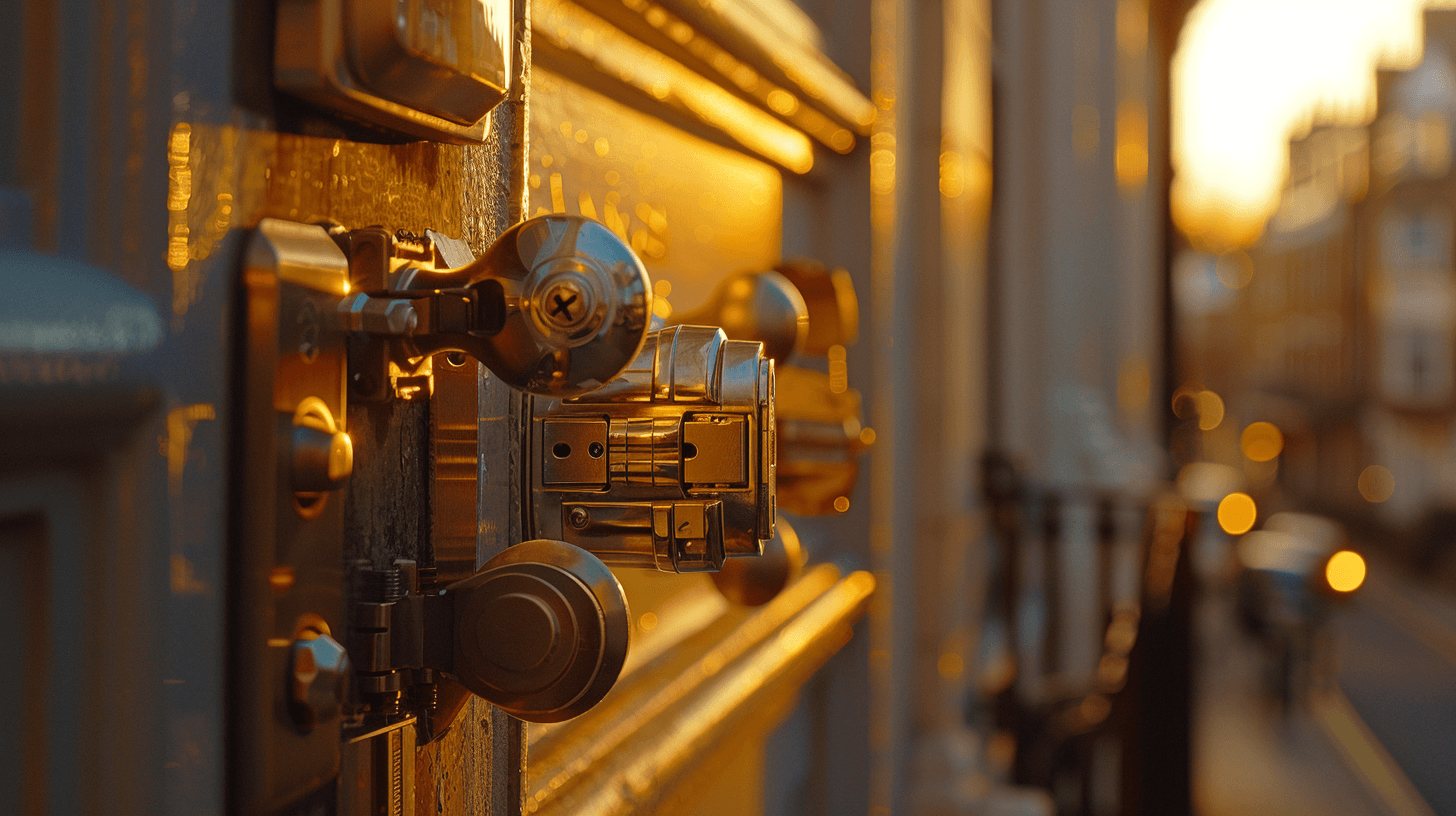
Understanding the fundamental differences between mechanical and electronic locks is essential for property owners seeking to enhance security. Mechanical locks, which have been the standard for centuries, rely on physical mechanisms and a key for operation. Electronic locks, on the other hand, utilise electronic components and often offer keyless entry options.
Core Differences Between Lock Types
Mechanical locks are revered for their durability and long-standing reliability. They require no power source and are less susceptible to technical malfunctions. Electronic locks, conversely, provide a higher level of customization and user control, often facilitated through digital interfaces.
Smart Locks and Property Security
Smart locks augment traditional security measures with features such as remote access, user tracking, and integration with home automation systems. This connectivity allows for real-time security alerts and the ability to grant or revoke access remotely.
Convenience of Electronic Locks
Electronic locks offer convenience without sacrificing security. Keyless entry systems eliminate the need for physical keys, reducing the risk of lost or stolen keys. Additionally, many electronic locks allow for temporary access codes, ideal for guests or service personnel.
Selection Considerations
When choosing between mechanical and electronic locks, consider the level of technological integration desired, the importance of remote access capabilities, and the potential need for regular maintenance. It is also crucial to assess the compatibility of electronic locks with existing security systems to ensure a cohesive security strategy.
Smart Lock Integration with Home Security Systems
Smart locks serve as a critical component in modern home security systems, offering enhanced functionality through technological integration. By connecting with other security devices, smart locks provide a seamless security experience.
Benefits of Smart Lock and Home Security System Integration
Integrating smart locks with home security systems yields numerous benefits. It centralises control, allowing you to manage various security features from a single platform. This integration often results in real-time alerts and the ability to customise access for individuals, enhancing both security and convenience.
Optimal Features for Remote Access and Control
The most advantageous features of smart locks include remote access, the ability to set custom entry codes, and the monitoring of entry and exit logs. These features ensure that you can control and review access to your property from any location, at any time.
Ensuring Compatibility with Security Devices
To ensure compatibility, property owners should verify that the smart lock supports standard communication protocols like Z-Wave or Zigbee, which are commonly used in home automation and security devices. Additionally, choosing locks that are designed to work with widely-used home security brands can further guarantee a smooth integration process.
Advanced Lock Features for Enhanced Security
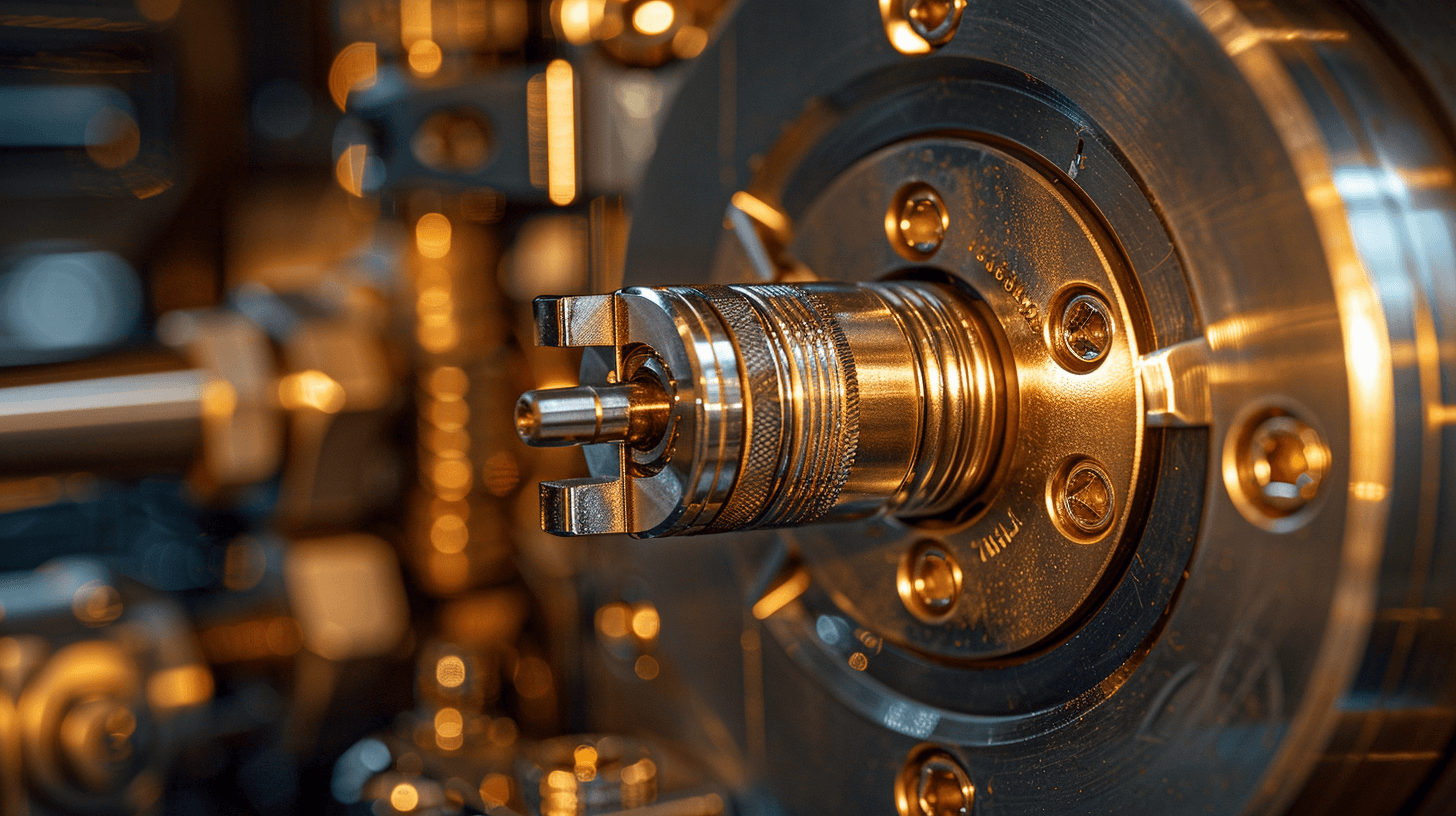
Selecting high-security locks for your property involves understanding the advanced features that contribute to their effectiveness. These features are designed to resist common methods of lock tampering and ensure the integrity of your security measures.
Key Features of High-Security Locks
When evaluating locks, property owners should prioritise the following advanced features:
- Anti-Snap Mechanisms: These prevent the lock cylinder from being snapped at its weakest point, typically near the front face of the lock.
- Anti-Drill Plates: Hardened steel plates or rods within the lock that deter drilling attempts.
- Anti-Pick Design: Complex pin configurations that challenge lock-picking efforts.
Weather Resistance and Lock Integrity
Weather resistance is crucial for maintaining lock functionality and longevity. Look for locks with materials and finishes that can withstand extreme temperatures, moisture, and other environmental factors.
Biometric and Encryption Security
For added security layers, consider locks with biometric verification, which uses unique physical characteristics like fingerprints for access. Encryption features in electronic locks protect against unauthorised digital access by scrambling the communication between the lock and the control system.
By incorporating these advanced features, property owners can significantly enhance the security of their locks, deterring unauthorised entry and providing peace of mind.
The Role of Professional Installation in Lock Security
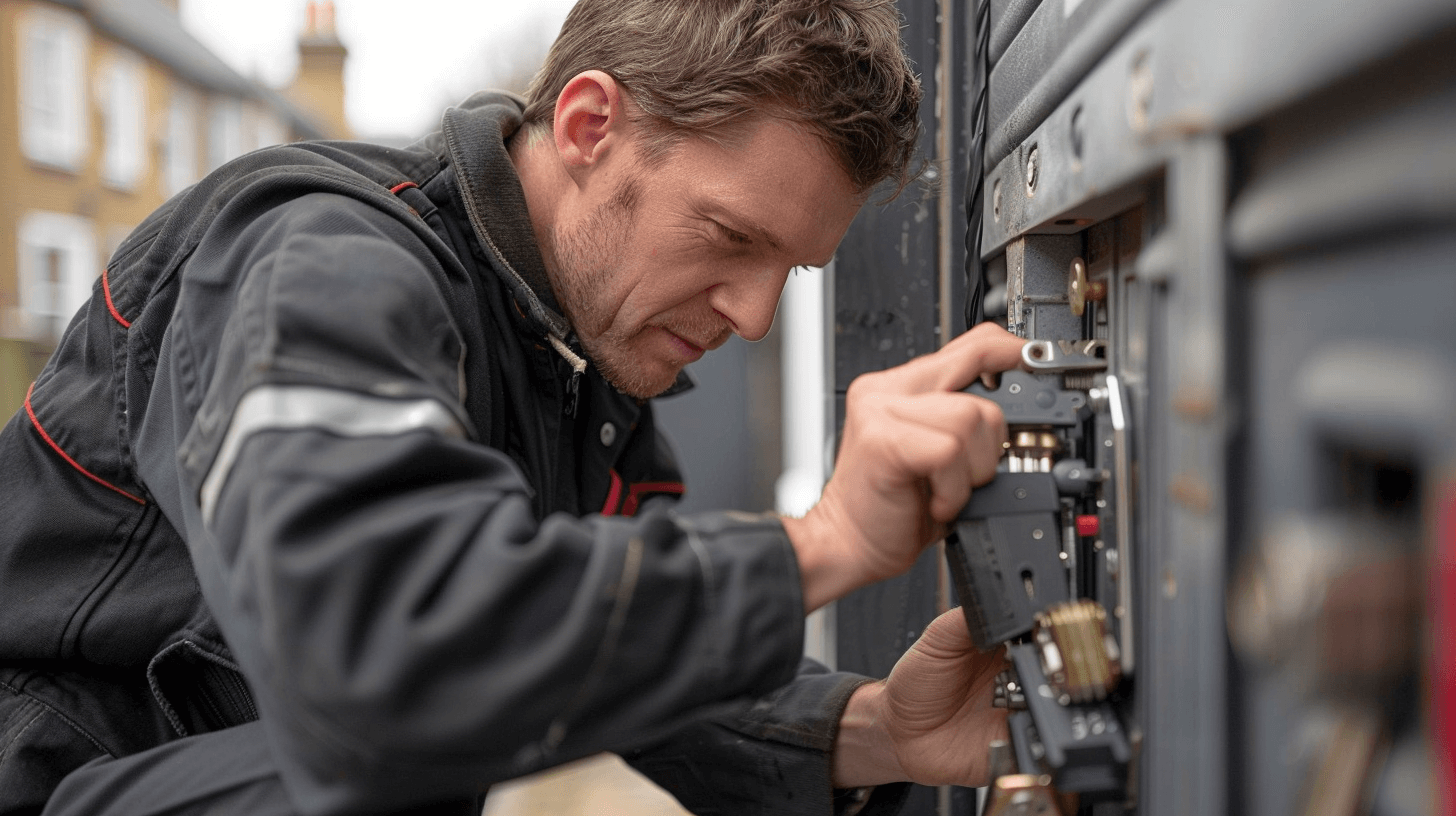
Professional installation is a cornerstone of effective lock security. Locksmiths and contractors bring specialised knowledge and tools that are essential for ensuring that high-security locks function as designed.
Qualifications of Locksmiths and Contractors
When selecting a professional for lock installation, property owners should verify their qualifications, which include:
- Accreditations: Look for endorsements from recognised bodies such as the Associated Locksmiths of America (ALOA) or certifications from relevant industry organisations.
- Experience: Seasoned professionals will have a track record of successful installations and should be able to provide references upon request.
- Insurance: Ensure that the locksmith or contractor is insured to protect against any potential damages during installation.
Ensuring Compliance with Security Standards
Professional installers are versed in the latest security standards and building codes. Their expertise ensures that locks are installed in compliance with these regulations, which can affect insurance premiums and legal liability.
Risks of DIY Lock Installation
DIY lock installation can lead to common pitfalls, such as improper alignment or calibration, which can compromise the lock’s integrity and effectiveness. Additionally, incorrect installation may void warranties or fail to meet security standards, leaving the property vulnerable.
Legal and Insurance Implications of Lock Selection
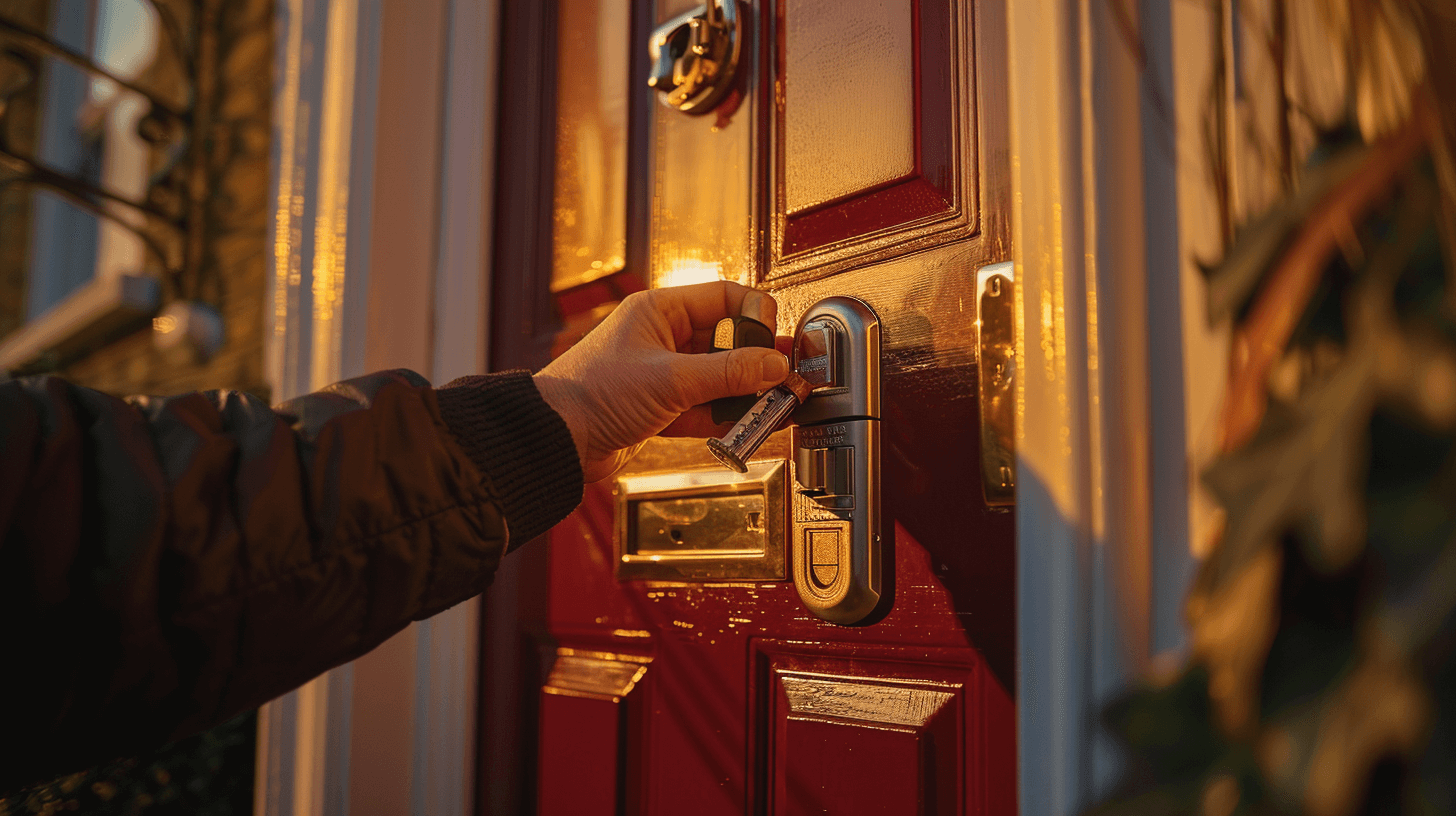
Selecting the appropriate locks for your property is not only a security matter but also a legal and insurance consideration. Compliance with building codes and insurance requirements is paramount when choosing locks to ensure both safety and coverage.
Building Codes and Insurance Requirements
Building codes often dictate the types of locks required for different types of doors and windows. These regulations are designed to ensure a minimum level of security and safety for occupants. Insurance companies may also mandate certain lock types or grades as a condition for coverage, particularly for high-value properties.
Navigating Legal Standards for Property Locks
When upgrading locks, property owners must adhere to legal standards that may include local, state, or national regulations. Non-compliance can lead to legal liabilities and potentially void insurance policies. It is advisable to consult with a professional locksmith who is familiar with these standards.
Warranty Protection for High-Security Locks
High-security locks typically come with manufacturer warranties. Registering your product and understanding the terms of the warranty can provide additional protection and assurance that any defects will be addressed by the manufacturer.
Insurance Benefits of Certified Secure Locks
Installing locks that meet recognised security certifications such as ANSI Grade 1 can lead to reduced insurance premiums. Insurers recognise the decreased risk associated with higher-grade locks and often incentivize property owners with discounts for enhanced security measures.
Aesthetic Considerations for Secure Locks
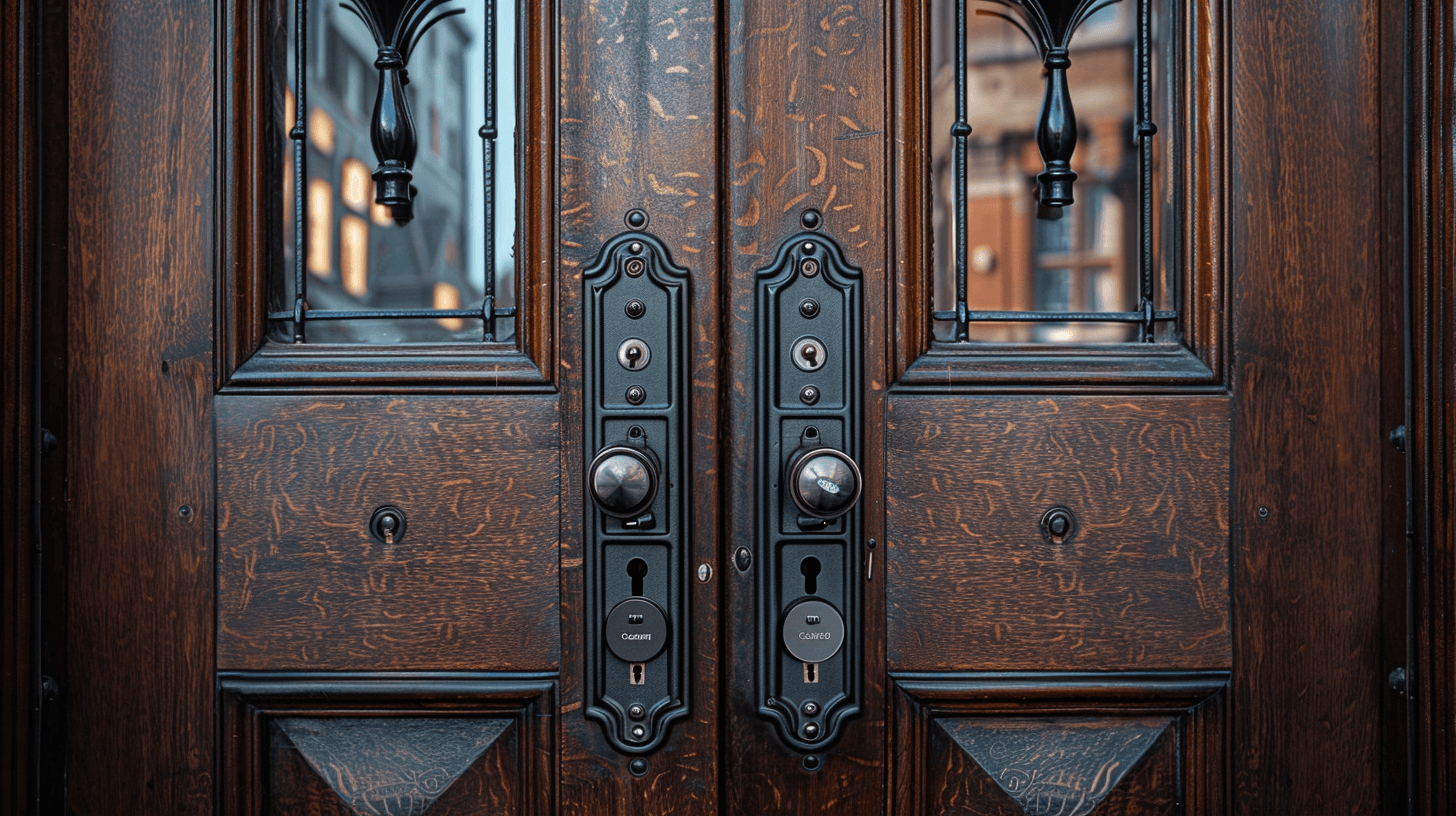
When enhancing property security, the visual appeal of locks should not be overlooked. Aesthetic considerations play a significant role in lock selection, particularly for businesses where the appearance can influence customer perception.
Balancing Security and Style
Secure locks need not detract from a property’s appearance. Manufacturers offer a variety of finishes and designs that can complement your property’s aesthetic. When selecting locks, consider how the design aligns with your architectural style and whether it contributes to a cohesive look.
Style Compatibility Factors
The finish of a lock is a key factor in style compatibility. Options range from classic brass to modern matte black, allowing for coordination with existing hardware or design themes. Additionally, consider the lock’s form factor and how it integrates with the door’s design.
Impact on Professional Appearance
For businesses, the appearance of security measures can convey professionalism and attention to detail. High-quality, well-designed locks suggest a commitment to both security and customer experience. They should enhance, not detract from, the professional image of the premises.
Selecting locks with both security and aesthetic appeal ensures that practicality and design work in tandem, reflecting the property owner’s dedication to excellence in all aspects of their property.
Emergency Access and Lock Maintenance

Preparing for High-Security Lockouts
In the event of a lockout, having emergency solutions in place is crucial. Property owners should consider the following:
- 24/7 Locksmith Services: Ensure access to a locksmith who offers round-the-clock service.
- Backup Entry Methods: For electronic locks, maintain a physical key or alternative entry method in case of power failure or system malfunction.
Regular Maintenance for Lock Longevity
To maintain the reliability and longevity of locks, regular maintenance is key:
- Inspection and Cleaning: Periodically check locks for signs of wear and clean them to prevent debris accumulation.
- Lubrication: Apply appropriate lubricants to moving parts to ensure smooth operation.
Best Practices for Lock Care
Adhering to best practices in lock care can prevent future issues:
- Grading: Familiarise yourself with the lock grading system and choose locks that meet high-security standards.
- Professional Assessment: Have locks assessed by a professional locksmith to identify potential vulnerabilities.
Ensuring Access to Emergency Services
To guarantee 24/7 access to emergency services:
- Research Local Providers: Identify reputable locksmiths in your area and keep their contact information readily available.
- Service Agreements: Consider service agreements with locksmiths for priority response in emergency situations.
Innovations in Lock Technology and Future Trends
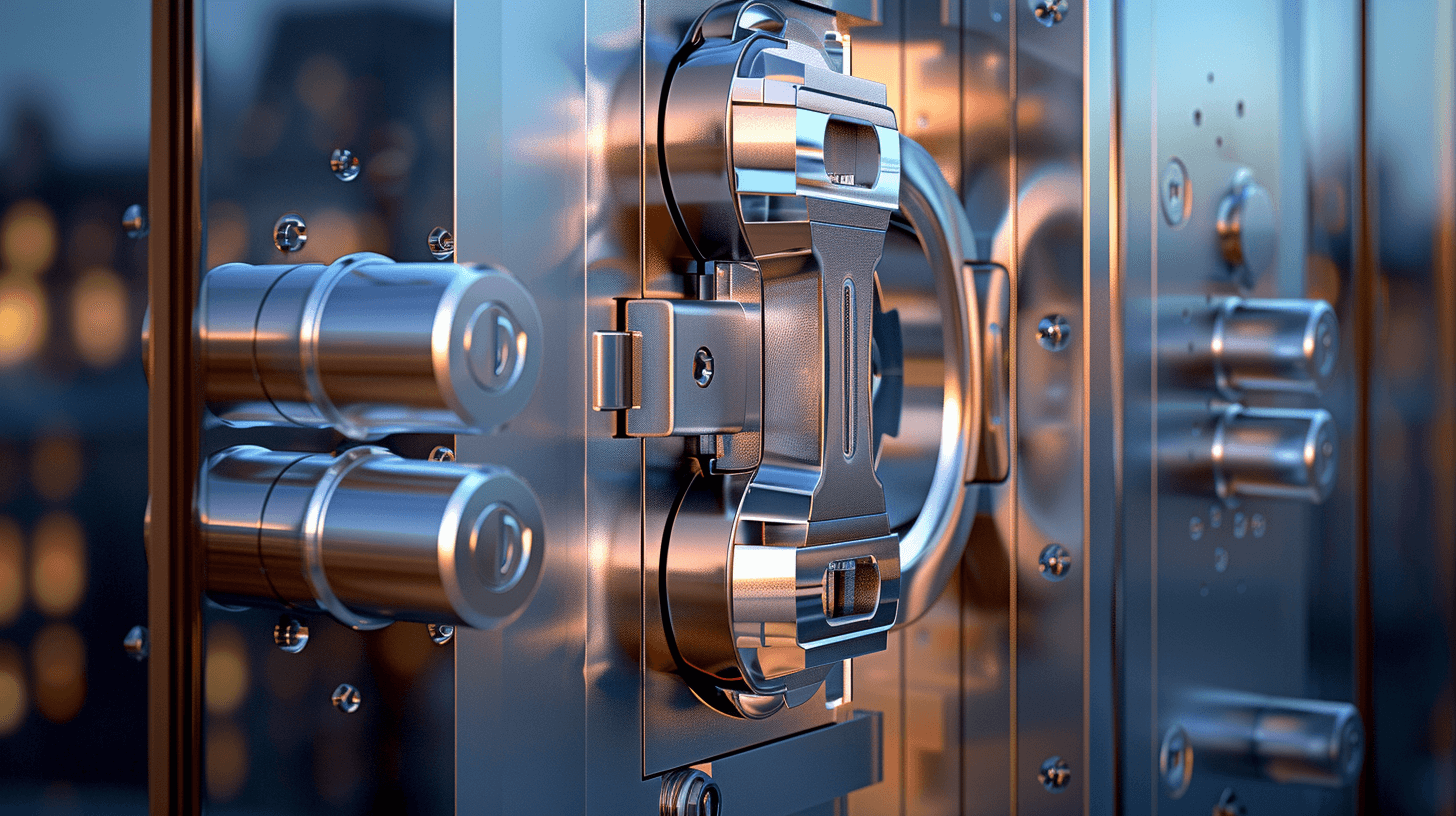
The landscape of lock security is rapidly evolving, with recent advancements aimed at enhancing the robustness and intelligence of property security systems.
Recent Advancements in Lock Security
Recent innovations in lock technology have focused on integrating digital capabilities with traditional mechanisms. Smart locks with fingerprint access, Wi-Fi connectivity, and remote control via apps are now common. These features allow for real-time monitoring and management of access, providing a new level of convenience and security.
Evolution of Property Security
The evolution of lock technology is significantly influencing property security by shifting the focus from purely mechanical solutions to those that are interconnected and intelligent. The integration of locks with home automation systems and the ability to customise user access are examples of how technology is adding layers of security and functionality.
Emerging Security Features
Looking to the future, security features such as biometric verification and cryptographic security are becoming more prevalent. These technologies offer a more personalised and secure approach to access control, making unauthorised entry exceedingly difficult.
Staying Informed on Security Solutions
Property owners can stay informed about innovative security solutions by following industry news, attending trade shows, and consulting with professional security experts. Manufacturers often provide updates and resources that can help in understanding the benefits and applications of new lock technologies.
Comprehensive Security: Beyond the Lock

Enhancing Locks with Additional Security Measures
Locks are a fundamental component of property security, but they are most effective when part of a broader security strategy. CCTV systems serve as a visual deterrent and provide real-time surveillance, recording any unauthorised attempts to bypass locks. Barriers, such as Armco barriers, complement locks by restricting vehicular access to sensitive areas.
Fencing for Privacy and Security
Fencing options like V-Mesh, Timber, and Palisade not only enhance privacy by obstructing external views but also add a layer of security by creating a physical boundary that deters intrusion. Razor Wire atop fences acts as an additional deterrent, signalling a robust security presence.
Layered Security Strategy
A layered security strategy integrates various security measures to create a comprehensive defence system. This includes combining locks with access control systems, CCTV, and physical barriers to address security at multiple levels.
Tailored Solutions for Different Property Types
Security solutions should be tailored to the specific needs of different property types. Residential properties may prioritise aesthetics and ease of use, while commercial and industrial properties might focus on advanced access control and surveillance systems. Government and apartment security often require a combination of high-level access control, surveillance, and robust physical barriers.
Selecting the Right Security Installation Company

When fortifying your property with secure locks, the expertise of the installation company is as crucial as the hardware itself. Here are key considerations to ensure you choose a provider that meets your security needs effectively.
Factors in Choosing a Security Installation Provider
Selecting a security installation company requires careful consideration of several factors:
- Experience and Expertise: Look for a company with a proven track record in installing high-security locks and systems.
- Range of Services: Ensure the provider offers a comprehensive suite of services, including assessment, installation, and maintenance.
- Customer Reviews: Seek feedback from previous customers to gauge the company’s reliability and service quality.
The Significance of Company Accreditations
Accreditations are indicators of a company’s commitment to industry standards:
- NICEIC and ISO Certifications: These certifications demonstrate adherence to rigorous quality and safety standards.
- Safe Contractor Approval: This reflects the company’s dedication to health and safety protocols.
Ethos and Service Quality
The ethos of a security installation company can be telling of the service you will receive:
- Promptness: A provider’s ability to respond swiftly to service requests is essential.
- Efficiency: Look for a company that is known for completing installations with minimal disruption.
- Qualified Personnel: Ensure that the company employs experienced and qualified technicians.
Choosing the right security installation company is pivotal in ensuring that your high-security locks are installed correctly, providing you with the ultimate peace of mind.
Final Thoughts on Securing Your Property

Selecting the right locks is a critical step in safeguarding your property and achieving peace of mind. High-quality security locks are an investment in the safety and integrity of your premises.
Contribution of High-Security Locks to Safety
High-security locks contribute significantly to property safety by providing robust protection against unauthorised entry. Their advanced features, such as anti-pick, anti-drill, and anti-snap mechanisms, act as strong deterrents to potential intruders, thereby enhancing your peace of mind.
Long-Term Benefits of Quality Security Locks
Investing in high-quality security locks offers long-term benefits:
- Durability: Superior materials and construction mean these locks can withstand the test of time and adverse conditions.
- Reduced Maintenance: High-grade locks typically require less frequent servicing, saving you time and money.
- Insurance Advantages: Many insurers offer premium discounts for properties equipped with certified high-security locks.
Assessing Lock Adaptability and Maintenance
To assess the adaptability and maintenance needs of your locks:
- Consult Experts: Engage with professional locksmiths to understand the maintenance schedules for different lock types.
- Review Manufacturer Guidelines: Manufacturers provide instructions on care and maintenance to ensure optimal performance.
Why Choose All Service 4U for Security Needs
All Service 4U stands out as a provider of comprehensive security solutions. Their expertise, range of services, and commitment to customer satisfaction make them a reliable choice for your security installation and maintenance needs.

